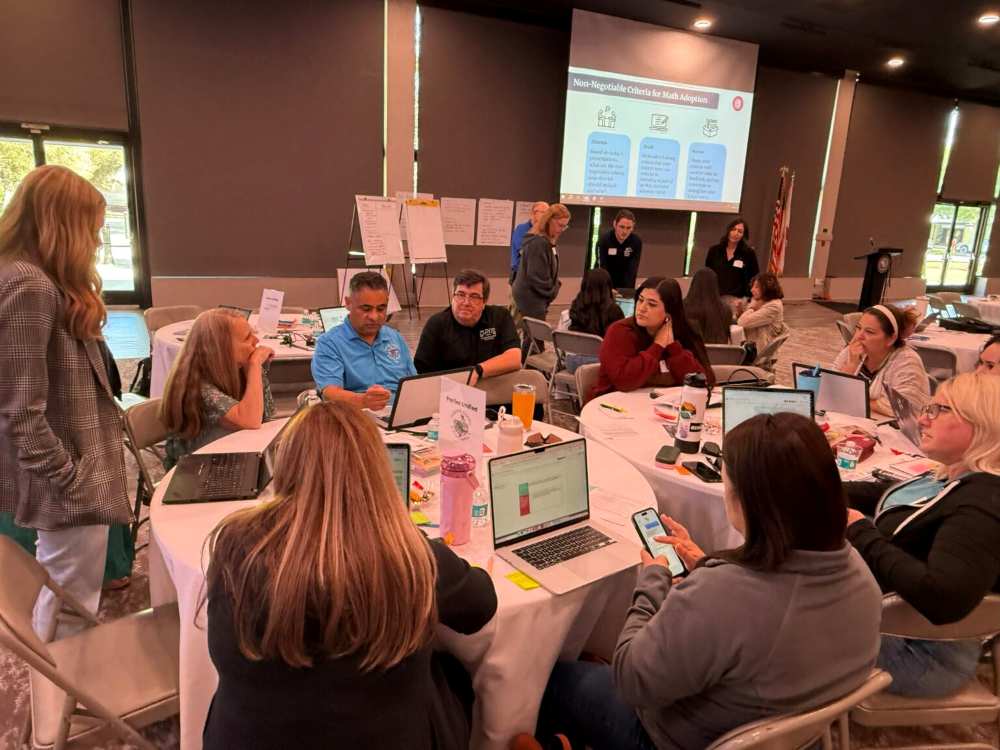What We Do For Education Leaders
Drive systemic change by ensuring curriculum adoption & implementation plans include high-quality instructional materials that support multilingual learners.






The Challenge
Meeting the needs of multilingual learners is a top priority for state and district leaders. Selecting instructional materials that address these needs while benefiting all students requires thoughtful planning and effective tools.
With clear guidance, leaders can make informed, equitable decisions that maximize the impact of their curriculum adoption and implementation efforts.
How We Help
ELSF equips state, district, and school leaders with the knowledge and tools to adopt and implement core instructional materials that are responsive to multilingual learners.
Our approach includes:
- Comprehensive training: Professional learning sessions tailored to help leaders understand and prioritize multilingual learners’ needs.
- Research-backed practices: Up-to-date guidance grounded in evidence, brought to you by experts in education, advocacy, and implementation.
- Practical solutions: Strategies for integrating multilingual learner needs into adoption criteria and implementation plans.
Outcomes
With ELSF’s support, education leaders are empowered to:
- Identify, adopt, and implement instructional materials that center multilingual learners’ academic and linguistic needs.
- Develop clear, equity-focused adoption criteria and implementation processes.
- Use curriculum budgets more effectively to achieve greater impact for all students.
Addressing the needs of multilingual learners is essential for achieving educational equity. Together, we help states and districts ensure every student has access to high-quality materials that foster success and opportunity.
The Challenge
Meeting the needs of multilingual learners is a top priority for state and district leaders. Selecting instructional materials that address these needs while benefiting all students requires thoughtful planning and effective tools.
With clear guidance, leaders can make informed, equitable decisions that maximize the impact of their curriculum adoption and implementation efforts.

How We Help
Meeting the needs of multilingual learners is a top priority for state and district leaders. Selecting instructional materials that address these needs while benefiting all students requires thoughtful planning and effective tools.
Our approach includes:
- Comprehensive training: Professional learning sessions tailored to help leaders understand and prioritize multilingual learners’ needs.
- Research-backed practices: Up-to-date guidance grounded in evidence, brought to you by experts in education, advocacy, and implementation.
- Practical solutions: Strategies for integrating multilingual learner needs into adoption criteria and implementation plans.

Outcomes
Meeting the needs of multilingual learners is a top priority for state and district leaders. Selecting instructional materials that address these needs while benefiting all students requires thoughtful planning and effective tools.
- Identify, adopt, and implement instructional materials that center multilingual learners’ academic and linguistic needs.
- Develop clear, equity-focused adoption criteria and implementation processes.
- Use curriculum budgets more effectively to achieve greater impact for all students.
Addressing the needs of multilingual learners is essential for achieving educational equity. Together, we help states and districts ensure every student has access to high-quality materials that foster success and opportunity.

How we can collaborate
Adoption support
A focused review of adoption frameworks and strategies, with actionable feedback to ensure multilingual learners are prioritized throughout the adoption process.
Adoption training
Targeted training to build an understanding of quality supports for multilingual learners, including materials analysis, adoption criteria, and implementation planning.
Strategy and systems support
Customizable support to help state and district leaders develop strategies, structures, and systems that ensure effective and equitable implementation of instructional materials.








